| Jezebel | |
|---|---|
.jpg.webp) Theatrical release poster | |
| Directed by | William Wyler |
| Written by |
|
| Based on | Jezebel 1933 play by Owen Davis |
| Produced by | William Wyler |
| Starring | |
| Cinematography | Ernest Haller |
| Edited by | Warren Low |
| Music by | Max Steiner |
Production company | Warner Bros. |
| Distributed by | Warner Bros. |
Release dates |
|
Running time | 103 minutes |
| Country | United States |
| Language | English |
| Budget | $1.25 million[1] |
Jezebel is a 1938 American romantic drama film released by Warner Bros. and directed by William Wyler.[2]
It stars Bette Davis and Henry Fonda, supported by George Brent, Margaret Lindsay, Donald Crisp, Richard Cromwell and Fay Bainter. The film was adapted by Clements Ripley, Abem Finkel, John Huston and Robert Buckner from the 1933 play by Owen Davis Sr.
The film tells the story of a headstrong young Southern woman during the antebellum period whose actions cost her the man she loves.
In 2009, Jezebel was included in the annual selection of 25 motion pictures added to the National Film Registry by the Library of Congress as "culturally, historically or aesthetically" significant and recommended for preservation.[3][4][5][2]
Plot

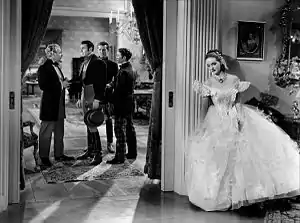
In 1852 New Orleans, spoiled, strong-willed belle Julie Marsden is engaged to banker Preston "Pres" Dillard. In an important meeting, Pres is trying to convince the board to invest in railroads, as Northerners are doing, and supporting Dr. Livingstone's plea for measures to prevent another outbreak of yellow fever.
In retaliation for Pres refusing to leave the meeting to accompany her to the last fitting for her ball gown, Julie buys a brazen red satin dress ordered by a notorious woman. Unmarried women are expected to wear virginal white at the Olympus Ball, the most important social event of the year. All of Julie's friends are horrified, but no one can dissuade her.
At the Olympus Ball, Julie's attire is met with shock and disgust by all present. She begs Pres to take her away, but instead he forces her to dance with him while all the other couples leave the floor. When the orchestra stops playing at the instruction of one of the ball's sponsors, Pres tells the conductor to continue. Pres and Julie finish the dance.
Pres later leaves Julie, implicitly breaking their engagement. In a final act of spite, Julie slaps him in the face. Aunt Belle Massey urges her pursue him, but she refuses, stating that he will return to her. Instead, he goes north on business. Julie secludes herself at home and refuses to see visitors.
A year later, Pres finally returns, bringing his Northern wife Amy to a homecoming party in his honor at Halcyon Plantation, Julie's estate. Aunt Belle cannot find Julie in time to warn her. Before Pres can stop her, Julie, wearing a luminous white gown, humbles herself and begs for his forgiveness and a return of his love. Pres then introduces her to Amy.
Julie prods her longtime admirer, skilled duelist Buck Cantrell, to quarrel with Pres, but the scheme goes awry. Pres' inexperienced brother Ted is goaded into challenging Buck, but Ted kills Buck.
As Dr. Livingstone had foretold, a deadly epidemic sweeps through the city. The people fight it with cannon and smoke and, believing that yellow fever is highly contagious, a quarantine so rigid that people who try to escape the city are shot. In New Orleans, Pres is stricken and is to be quarantined in the leper colony on Lazaret Island. Julie goes to Dr. Livingstone's house and nurses Pres for a night and a day. The family arrives, having been granted a pass from the governor. When the wagon comes for Pres, Amy begs to accompany him, but Julie tells her that she is not equipped to fight for Pres. Amy does not know the creole words for food and water or how to deal with the conditions or the people there. Julie begs to go in her place to try to redeem herself. Before agreeing, Amy asks if Pres still loves Julie. Julie declares that he loves only his wife. Amy blesses them, and Julie accompanies Pres on a wagon loaded with other victims and caregivers.
Cast
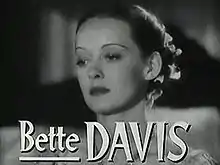 | Bette Davis as Julie Marsden |  | Henry Fonda as Preston Dillard |
 | George Brent as Buck Cantrell |  | Donald Crisp as Dr. Livingstone |
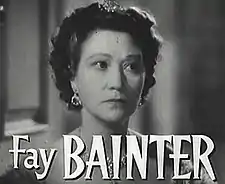 | Fay Bainter as Aunt Belle Massey | ||
- Margaret Lindsay as Amy Bradford Dillard
- Richard Cromwell as Ted Dillard
- Henry O'Neill as General Theopholus Bogardus
- Spring Byington as Mrs. Kendrick
- John Litel as Jean La Cour
- Gordon Oliver as Dick Allen
- Janet Shaw as Molly Allen
- Theresa Harris as Zette
- Margaret Early as Stephanie Kendrick
- Irving Pichel as Huger
- Eddie Anderson as Gros Bat
- Matthew "Stymie" Beard as Ti Bat (credited as Stymie Beard)
- Lew Payton as Uncle Cato
- George Renavant as De Lautruc
- Ann Codee as Mme. Poullard (uncredited)
- Stuart Holmes as Doctor at Duel (uncredited)
Background
Turner Classic Movies states that the lead role was offered as compensation for Bette Davis after she failed to win the part of Scarlett O'Hara in Gone with the Wind (1939),[6] although David O. Selznick never seriously considered her for it. Jezebel was her second Best Actress Oscar win after winning for Dangerous three years earlier.[7][2]
Selznick reportedly hired Max Steiner to score Gone with the Wind on the strength of his work on Jezebel.[8]
Warner Bros. originally sought to cast Cary Grant for the role of Preston Dillard, but the studio balked at his salary demand of $75,000 and cast Henry Fonda instead.
Reception
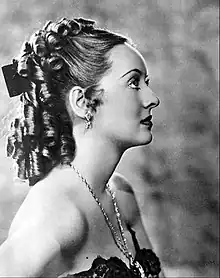
Contemporary reviews were generally positive and praised Davis' performance, although some found her character's redemption at the end of the film to be unconvincing.
The movie premiered at the Radio City Music Hall, and Frank S. Nugent of The New York Times wrote that the film "would have been considerably more effective ... if its heroine had remained unregenerate to the end. Miss Davis can be malignant when she chooses, and it is a shame to temper that gift for feminine spite ... It is still an interesting film, though, in spite of our sniffs at its climax."[9]
Variety reported that the film was "not without its charm" and "even completely captivating" at times, but found it detracting that the main character "suddenly metamorphoses into a figure of noble sacrifice and complete contriteness," and described the ending as "rather suspended and confusing."[10]
Film Daily called it "a really outstanding screen triumph for Bette Davis. She plays an emotional role that calls for running the gamut of emotions, and she handles the part with consummate artistry."[11]
Harrison's Reports called it "Powerful dramatic entertainment ... It is not what one would call cheerful entertainment, and may not appeal to the rank and file, but it should please those who like good acting."[12]
John Mosher of The New Yorker wrote, "Something went wrong with 'Jezebel,' possibly nothing more than the plot, and all its rich dressing-up can't make it alive ... no scene quite comes off, and at the end, when the she-devil suddenly turns into a saint and a martyr, one isn't even interested. This Jezebel just seems daffy."[13]
The film has scored more positive reviews in later years and has a 94% rating at Rotten Tomatoes.[14]
Accolades
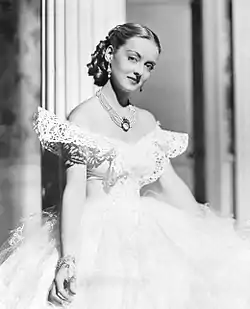
| Award | Category | Nominee(s) | Result |
|---|---|---|---|
| Academy Awards[15] | Outstanding Production | Hal B. Wallis and Henry Blanke (for Warner Bros.) | Nominated |
| Best Actress | Bette Davis | Won | |
| Best Supporting Actress | Fay Bainter | Won | |
| Best Cinematography | Ernest Haller | Nominated | |
| Best Scoring | Max Steiner | Nominated | |
| National Board of Review Awards[16] | Top Ten Films | 8th Place | |
| National Film Preservation Board | National Film Registry | Inducted | |
| Venice International Film Festival | Mussolini Cup (Best Foreign Film) | William Wyler | Nominated |
| Special Recommendation | Won | ||
See also
References
- Notes
- ↑ "Top Films and Stars". Variety. 4 January 1939. p. 10. Retrieved 18 March 2023.
- 1 2 3 O’Dell, Cary (19 April 2023). "Happy Birthday Bette Davis–You "Jezebel"!". Now See Hear! National Audio-Visual Conservation Center. Library of Congress. Retrieved 17 August 2023.
- ↑ "25 new titles added to National Film Registry". Yahoo News. Yahoo. 2009-12-30. Archived from the original on January 6, 2010. Retrieved 2009-12-30.
- ↑ "Complete National Film Registry Listing". Library of Congress. Retrieved 2020-05-01.
- ↑ "Michael Jackson, the Muppets and Early Cinema Tapped for Preservation in 2009 Library of Congress National Film Registry". Library of Congress. Retrieved 2020-05-01.
- ↑ "Jezebel: Trivia". Turner Classic Movies.
- ↑ Haver, Ronald (1980). David O. Selznick's Hollywood. Bonanza Books. p. 243. ISBN 0-517-47665-7.
- ↑ "Jezebel (1938) - Articles - TCM.com". Turner Classic Movies. Retrieved 2022-10-15.
- ↑ The New York Times Film Reviews, Volume 2: 1932-1938. New York: The New York Times & Arno Press. 1970. p. 1479.
- ↑ "Film Reviews". Variety. New York: Variety, Inc. March 16, 1938. p. 15.
- ↑ "Reviews". Film Daily. New York: Wid's Films and Film Folk, Inc.: 6 March 11, 1938.
- ↑ "Jezebel". Harrison's Reports. New York: Harrison's Reports, Inc.: 50 March 26, 1938.
- ↑ Mosher, John (March 19, 1938). "The Current Cinema". The New Yorker. New York: F-R Publishing Corp. pp. 73–74.
- ↑ "Jezebel". Rotten Tomatoes.
- ↑ "The 11th Academy Awards (1939) Nominees and Winners". oscars.org. Archived from the original on July 6, 2011. Retrieved 2011-08-16.
- ↑ "1938 Award Winners". National Board of Review. Retrieved July 5, 2021.
- Bibliography
- Dunning, John (1998). On the Air: The Encyclopedia of Old-Time Radio. New York: Oxford University Press. ISBN 0-19-507678-8..
External links
- Jezebel essay by Gabriel Miller on the National Film Registry website
- Jezebel essay by Daniel Eagan in America's Film Legacy, 2009-2010: A Viewer's Guide to the 50 Landmark Movies Added To The National Film Registry in 2009–10, Bloomsbury Publishing USA, 2011, ISBN 1441120025 pages 56–59
- Jezebel at the TCM Movie Database
- Jezebel at AllMovie
- Jezebel at IMDb
- Jezebel at the American Film Institute Catalog
- Jezebel at Rotten Tomatoes
- Jezebel review and information in cosmopolis.ch